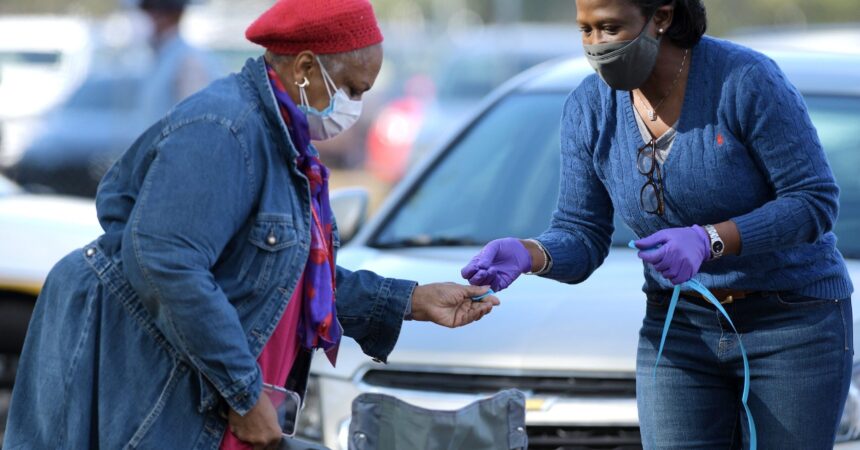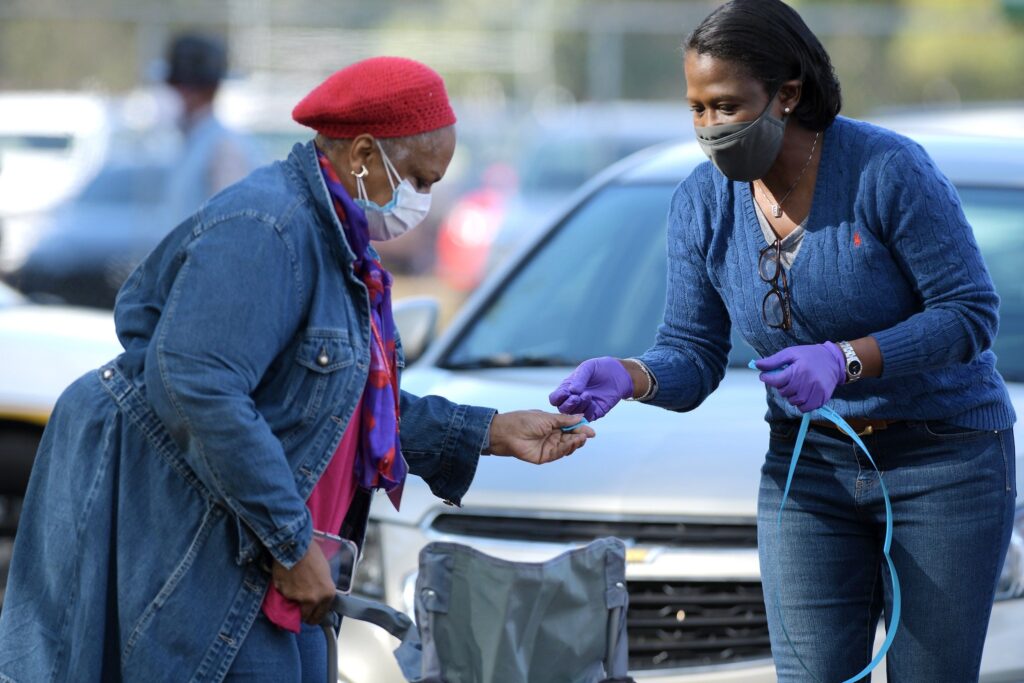
Churches join in push for vaccinations
Black clergy and community leaders are doing their part to get African Americans vaccinated

Bob Self/Florida Times-Union/TNS
Editor’s note: This story is republished with permission from the Florida Courier.
By Daphne Taylor
Florida Courier
Dianne Rowles, 67, of Tampa, said she made numerous calls this month to get an appointment for the COVID-19 vaccination for herself and her husband when appointments were made available in Florida to seniors.
When she finally got a person on the other end of the line after three days of trying, she got the disappointing news: There were no more appointments available. Frustrated, saddened and disappointed, she was left exasperated with little recourse.
A messy beginning
Therein lies the problem with the messy roll-out of the vaccination process – not only in Florida but across the United States. Although 22 million doses of the vaccine have been made available, according to the Centers for Disease Control, only 7 million have made it into the arms of actual persons in the country.
The process of getting people vaccinated has been deemed a sheer failure by all accounts, signified by long lines, hours on the telephone, and not being able to secure appointments.
Add to that mix, getting people of color, who are most susceptible to COVID-19, an appointment or to a convenient vaccine location, has been a nightmare.
“I have diabetes, I’m overweight, I’m Black, and I have allergy issues. My husband has COPD and asthma. I felt I should get the vaccine for the sake of us both,” said Rowles, who was finally able to get the vaccine – though not through her local health department.
Churches stepping in
In what she deems a true blessing, her private doctor referred her to a program offered through Tampa General Medical Center. Her husband didn’t qualify for the same program. And although he finally got an appointment, the wait continues for many, particularly people of color. That is, those who trust it.
“I’ve heard so many people say they don’t want to take it, but when I have so much against me, I’d rather take the vaccine than end up on a ventilator,” Rowles said. “I was very pleased.’’ Rowles also said she hasn’t had any side effects since taking the vaccine.
Thanks to some valiant efforts on behalf of the state’s Black clergy and leadership, things are moving in the right direction for African Americans in Florida when it comes to addressing trust issues relating to getting the vaccine.
After taking some heat, Governor Ron DeSantis, on Jan. 10, announced an initiative to work with Black churches to not only address the mistrust of Blacks when it comes to the vaccination, but also to make it readily available at churches and community centers in Black communities statewide.
Jan. 10 kickoff
The governor’s pilot program kicked off on Jan. 10 with vaccination sites at approximately 50 churches, particularly African American.
The program started out in Tampa, Lynn Haven, Fort Lauderdale, Hollywood, Jacksonville, Port Saint Lucie, and Tallahassee. The goal is to offer 500 doses at each site.
On Sunday, St. John Progressive Missionary Baptist Church in Tampa utilized all 500 doses.
“We really believe making sure these vaccines are getting into all segments of the community is important and we think working with our houses of worship is one way we can do that,” said DeSantis as he announced the initiative.
Putting on pressure
But DeSantis’ efforts are also fueled by a statewide task force created by the Rev. RB Holmes, pastor of Bethel Missionary Baptist Church in Tallahassee, who also owns a Black newspaper and two radio stations.
He called upon politicians, professionals, health-care workers and leadership to place emphasis on getting the vaccine into communities of color. The task force consists of other clergy and stakeholders throughout the state.
“We felt it was critically important to educate, inspire and inform our people to take the vaccine. The government cannot do this by themselves. They need to work with us to get our people this vaccine,” Holmes said in a telephone interview on Jan. 11.
The task force is also collaborating with all of the Historically Black Colleges and Universities in the state. State Senator Bobby Powell is also a member of the force.
Trusting the process
The Florida Statewide COVID-19 Vaccine Community Engagement Task Force’s mission is to get 60 to 70 percent of Blacks in the state vaccinated. Thus far, 6 percent of Blacks have been vaccinated, according to recent data.
“This is a sense of urgency,” said Holmes. Statewide data shows there are 3.4 million Blacks in Florida, making up about 16.9 percent of the state’s general population.
The other half of the equation of addressing Blacks and the vaccine is dealing with the mistrust that Blacks have concerning the medical community.
Since the days of the Tuskegee Experiment, where unsuspecting Blacks were injected with syphilis, Blacks have not trusted the government and its medical undertakings.
Convincing Blacks otherwise is a tough hill to climb. But Black leaders statewide are taking on the task.
More education
Patrick Franklin, president and CEO of the Urban League of Palm Beach County, said he doesn’t meet the age requirement yet, but he certainly will get the vaccine and he is urging Blacks across the board to do so as well.
“I know the history of the experimental things, but we need to stand tall and stand together on this. We can’t afford to lose any more people,” he said.
Franklin said there definitely needs to be more education on the issue directed in the Black communities.
“People behold so many myths and rumors that need to be put to rest. I will certainly do it.”
‘Lead by example’
Holmes recently rolled up his sleeves at a Tallahassee hospital and got the vaccine with news cameras rolling.
“We had to lead by example. This is not an organization (The task force.) It’s a movement,” said Holmes, who has lost clergy friends to the coronavirus.
Bishop Adam Jefferson Richardson Jr. of the 11th Episcopal District of the AME Church, is co-chair of the task force. He says everyone needs to spread the word and get vaccinated, calling upon family members, friends and congregants and the like.
Dr. Larry Robinson, president of Florida A & M University, also is on the task force. He hopes that HBCUs can be hubs for vaccinations because they are trusted sources in the Black community.
On Jan. 12, DeSantis also announced that he has implemented a program through more Publix stores to make the vaccine more accessible.
Publix soon will offer vaccinations in 105 stores across 12 counties. Appointments were to start at the stores on Wednesday with inoculations beginning on Thursday.
Appointments must be made online at publix.com/covid-vaccine.







